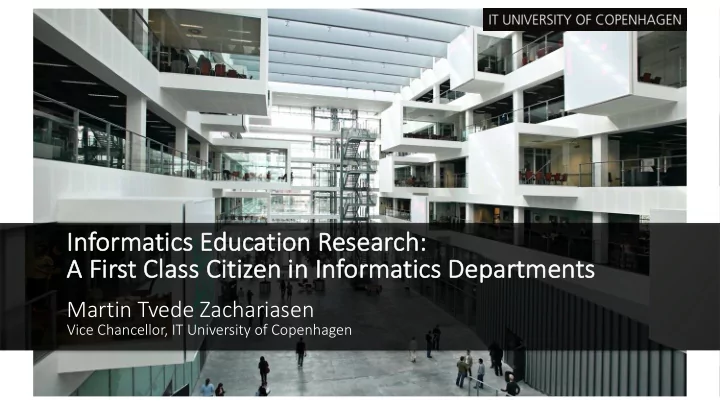

In Infor ormati tics E s Educati tion on R Resea esearch: A A Fi First Class Citizen in Informa matics cs Departme ments Martin Tvede Zachariasen Vice Chancellor, IT University of Copenhagen
Why are digital competences so important in the 21 st century? Societal/citizen perspective: The world is increasingly becoming digital, and every citizen needs digital competences to participate in a digital democratic society. Economic/future-of-work perspective: Most job functions in the future will require some level of digital competences, and humans will increasingly perform their jobs in close interplay with computers. Technology perspective: Data, computation and networks (and the advancement of artificial intelligence) transform education, business, and society. 2
Challenge #1: We do not fully understand what digital competences are Several different terms used to describe (parts of) the competences that are needed: - Digital literacy - Digital empowerment - Computational thinking - Computational empowerment - (and more) The precise understanding of these terms and concepts, even within informatics education research, is an ongoing debate. 3
Challenge #2: Technology develops rapidly while general education develops slowly The development of general education – which is a democratic process – will always be behind the development of technology: "The number of transistors and resistors on a chip doubles every 18 months” (Gordon Moore, 1965) “Democracy is slow and that is a good thing. Its pace reflects the tens of millions of conversations […] gradually stirring the sleeping giant of democracy to action” (Shoshana Zuboff, 2020) 4
Challenge #3: Women are under-represented in informatics This is a problem for several reasons: 1) Huge demand for digital competences; mainly recruiting from half the talent pool is a serious waste of talent. 2) Informatics is a key force in the digital transformation of society and plays an increasing role in shaping our future; important that digital artifacts are created by a more representative part of the population. 3) Women are missing out: A career in informatics gives opportunities, job flexibility and good lifetime earnings. 5
General Informatics Education in Denmark: Primary School (1-9 th grade) New informatics subject with four core competence areas: - Digital empowerment - Digital design - Computational thinking - Use of computers, digital tools, and programming Advisory board including Prof. O. Sejer Iversen and Prof. M. E. Caspersen Pilot project with 46 schools (3-year experiment 2019-2021): - own stand-alone subject (23 schools); versus: - integrated in other subjects (23 schools). 6
General Informatics Education in Denmark: Secondary School (10-12 th grade) Subject “Informatics” introduced in 2011 with the following content: - User-centric design of IT-systems - Internet, security, and computer architecture - Databases and data representation - Programming - Interaction design - Innovation The subject is currently mandatory on one of four tracks (Business track); semi-mandatory on the Classical and Technical tracks. 7
General Informatics Education in Denmark: New further education for secondary school teachers The Danish universities have worked together to establish a 60 ECTS programme called Master of Informatics Teaching. Target group: High School teachers who would like to teach the subject “Informatics” – but also relevant for primary and lower secondary school teachers. Officially offered by Aarhus University. First students admitted this autumn. 8
Informatics Education Research @ Danish universities Center for Digital Education Prof. M. Misfeldt, University of Copenhagen Center for Computational Thinking and Design Prof. O. Sejer Iversen, Aarhus University Center for Learning Computational Thinking Prof. N. Bonderup Dohn, University of Southern Denmark Center for Computational Thinking Prof. S. Burri Gram-Hansen, Aalborg University Center for Computing Education Research Prof. C. Brabrand, IT University of Copenhagen 9
Center for Computing Education Research @ IT University of Copenhagen Virtual opening Nov 5 You are welcome! Livestream @ ccer.itu.dk Research questions: 1) What are digital competences? 2) How to teach digital competences? 3) How to apply & teach digital competences in other disciplines? +) How to incorporate gender-/minority-inclusion +) How to incorporate online teaching/learning activities? TEKNOSOFIKUM project (2020-2023): Provide teachers at higher- education institutions with the necessary digital competences to teach their own discipline (pilot project includes architects, lawyers, and IT-teachers) 10
Conclusions – and Next Steps? Informatics is already transforming every discipline, and programming/coding will appear as a new communication form (‘learn to code’ and ‘code to learn’) We need to bring three groups of researchers together: 1. Researchers in didactics with an interest in informatics education (these are currently very rare) 2. Researchers in informatics/computer science with an interest in the didactics of informatics 3. Researchers from other disciplines who would like to develop the didactics for bringing the use of informatics into their field and education Question: Could Informatics Europe – jointly with other disciplines – provide recommendations on the integration of informatics into other disciplines/educations? 11
Recommend
More recommend